Overview
The article focuses on how deep core training can transform performance in the workplace by enhancing employee health and productivity. It supports this by outlining the benefits of improved posture and reduced absenteeism through targeted training programs, alongside case studies demonstrating significant decreases in workplace injuries and increases in productivity linked to such initiatives.
Introduction
In the modern workplace, where long hours and sedentary lifestyles are the norm, the importance of deep core training becomes increasingly apparent. This specialized training not only fortifies the muscles that support the spine and pelvis but also plays a pivotal role in maintaining proper posture and preventing injuries.
With research highlighting the correlation between poor posture and a rise in workplace injuries, such as carpal tunnel syndrome, organizations are beginning to recognize the need for comprehensive wellness strategies. By focusing on enhancing core strength, companies can significantly improve employee health, reduce absenteeism, and ultimately boost productivity.
As businesses strive for a healthier work culture, the integration of deep core training is emerging as a vital component of employee well-being initiatives.
Understanding Deep Core Training and Its Importance in the Workplace
Deep core training is crucial for fortifying the muscles that stabilize the spine and pelvis, which are essential components for maintaining proper posture and preventing injuries in the workplace. Considering that numerous staff members spend lengthy durations sitting, the importance of this instruction cannot be emphasized enough. Research indicates that poor posture contributes significantly to workplace injuries, with a notable rise in conditions such as carpal tunnel syndrome, which can lead to potentially irreversible nerve damage.
Warren et al. identified three primary paradigms as the most influential work risk models for assessing work-related risks, emphasizing the importance of addressing these issues through training. By focusing on deep core training to enhance fundamental strength, employees can significantly improve their physical health, lower the risk of musculoskeletal disorders, and ultimately boost productivity.
Furthermore, a strong foundation correlates with enhanced balance and coordination, translating into superior performance across various job functions. Recent case studies have demonstrated that improper posture and frequent manipulation are major causes of discomfort, emphasizing the necessity for ergonomic education along with strength initiatives. Introducing ergonomic enhancements, such as adjustable keyboards and promoting regular breaks, can support intensive foundational exercises, highlighting the thorough approach required to cultivate a healthier and more efficient work setting.
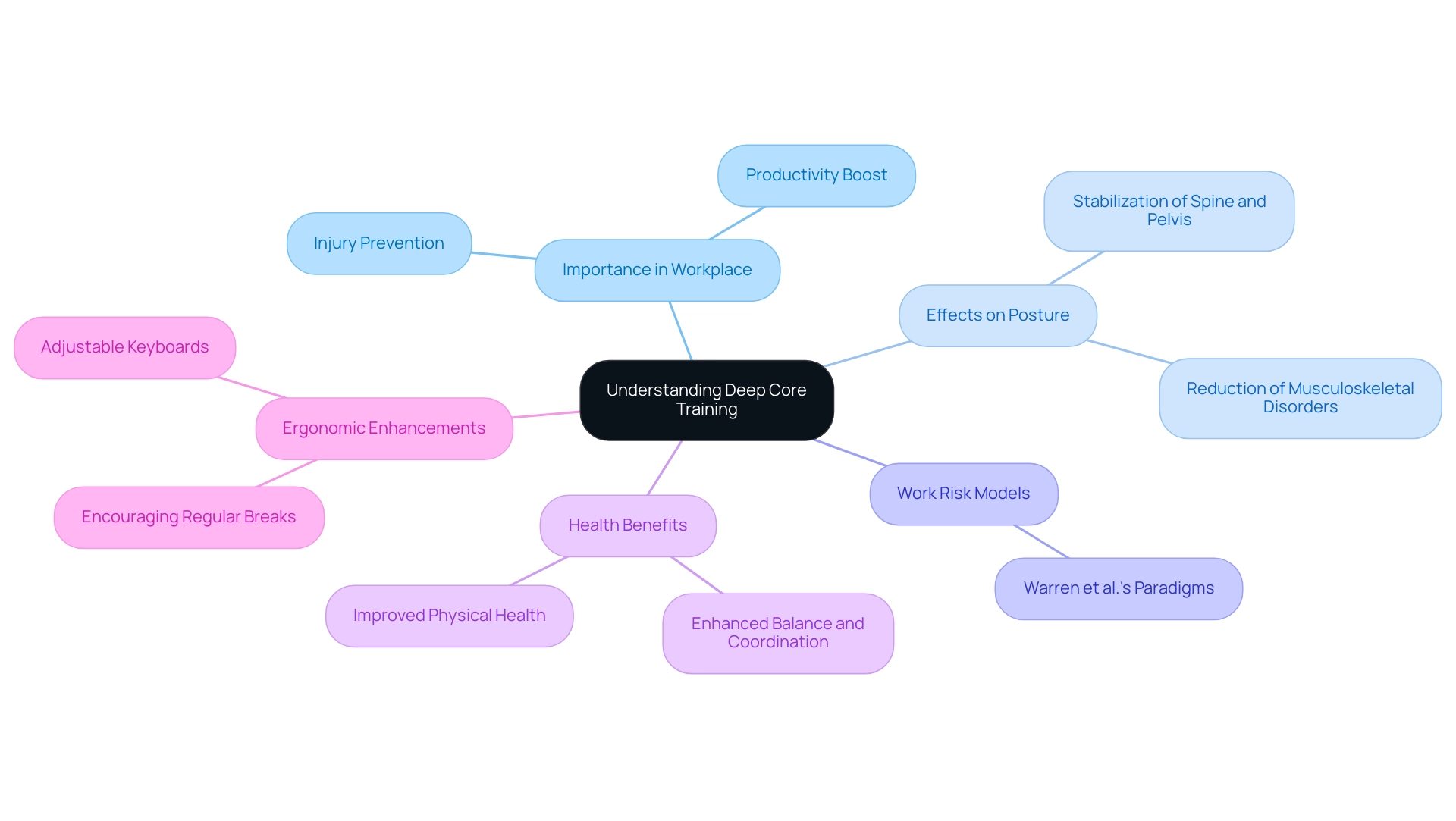
Benefits of Deep Core Training for Employee Performance and Well-Being
Intensive development offers numerous benefits that greatly influence staff performance and overall well-being. A critical benefit is its ability to substantially decrease absenteeism through a reduction in workplace injuries and health-related issues. Organizations aim for an absenteeism rate of approximately 1.5%, recognizing that some level of absence is inevitable.
Nonetheless, applying fundamental exercises can assist in reaching this goal by fostering stronger muscles that sustain the body and avert injuries. Significantly, elevated levels of worker involvement are frequently linked to reduced absenteeism rates, rendering fundamental development an essential element of workplace wellness approaches. Moreover, staff members who frequently engage in fundamental training often indicate increased energy levels, better stress management, and enhanced mental clarity.
Experts emphasize that 'strong central muscles not only bolster physical health but also contribute to improved focus and productivity throughout the workday' (Groenewold MR). The stamina acquired from foundational strength enables workers to sustain greater levels of focus, which is crucial for peak performance. Additionally, it is crucial to consider legal implications related to absenteeism, such as the Americans with Disabilities Act (ADA) and the Family and Medical Leave Act (FMLA), which can affect how organizations manage employee absences.
Ultimately, these factors cultivate a healthier workplace culture, boosting overall team morale and cohesion. As organizations progressively observe trends in health-related absenteeism, the introduction of deep core training programs could serve as a crucial strategy in improving workplace well-being and productivity.
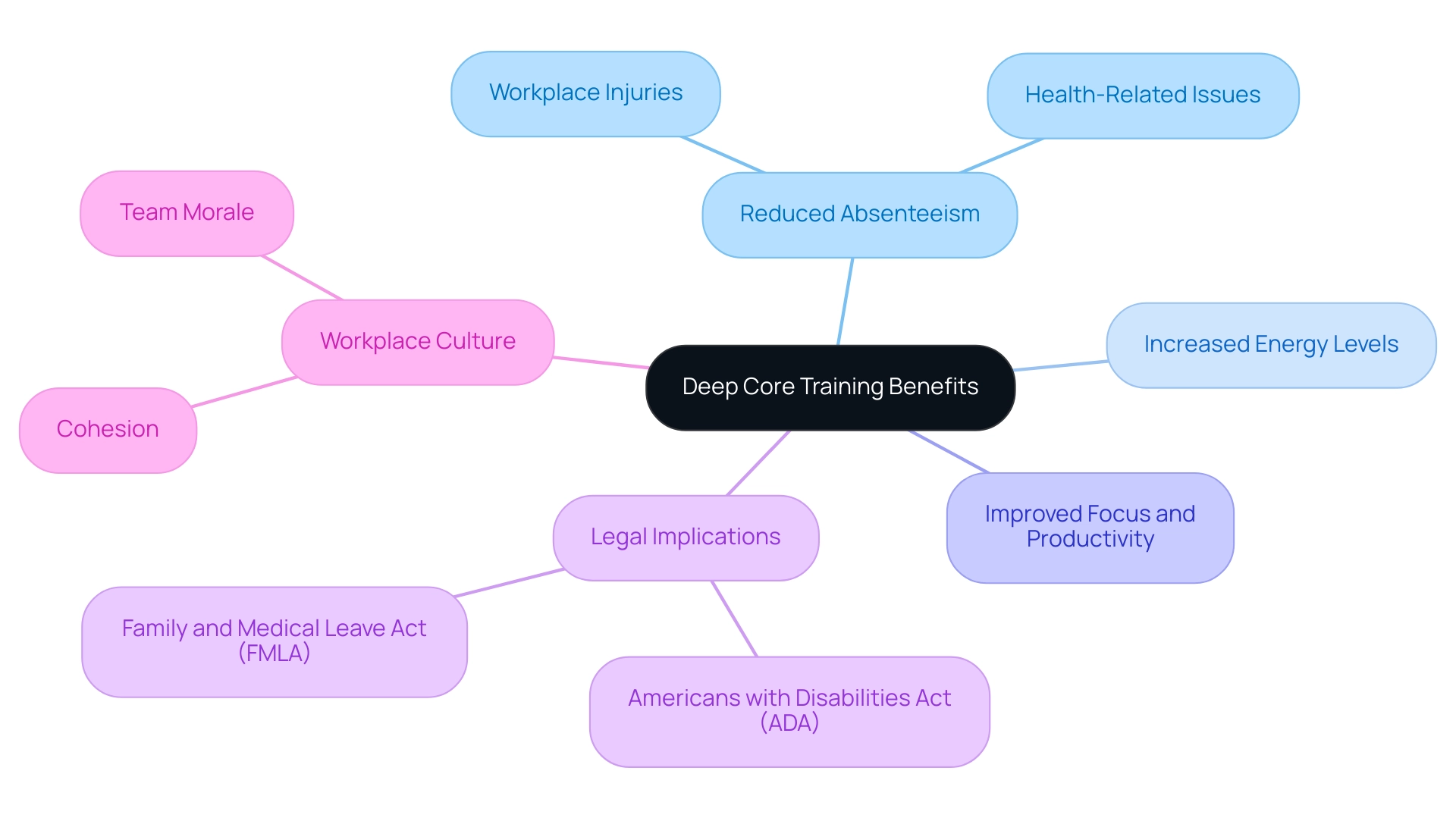
Implementing Deep Core Training Programs: Strategies for Success
To effectively execute deep core training programs, organizations should begin by thoroughly evaluating the specific requirements of their workforce. This can be accomplished through staff surveys or focus groups, which assist in assessing interest in essential development and evaluating current fitness levels. Following this assessment, collaborating with Foresight Health Coaching's certified fitness professionals is essential for designing customized training sessions, including deep core training, that cater to the unique needs of staff.
Foresight's comprehensive wellness services encompass not only fitness coaching but also nutritional guidance and wellness workshops, ensuring a holistic approach to health. Offering these sessions during work hours can facilitate participation, making it more convenient for staff to engage. Furthermore, fostering a supportive environment that encourages involvement—such as providing incentives for participation or integrating training into team-building activities—can significantly boost both engagement and program effectiveness.
As recent trends suggest, organizations that prioritize staff health and customize fitness initiatives are likely to experience enhanced productivity and morale. Notably, 22% of staff report experiencing verbal abuse at work, underscoring the need for a supportive workplace culture. Additionally, the case study on vendor selection criteria for health programs highlights the importance of pricing, flexibility, and customizability, which Foresight Health Coaching excels at in its corporate partnership offerings.
Specifically, corporate memberships encompass:
- In-person health discussions
- Comprehensive pantry and nutrition services
- White glove service
- Access to our health and fitness app, enhancing connectivity and support among staff
Echoing findings from Bank of America, which noted that health programs incorporating both mental and physical resources can lead to a staggering 50% increase in staff productivity, it is clear that addressing workforce needs with tailored health initiatives is paramount. Moreover, given that 79% of workers use mortgage assistance programs when accessible, organizations should acknowledge the similar significance of providing customized health programs that address staff needs.
For any questions regarding the implementation of these services or to discuss how Foresight can support your organization, please refer to our FAQ or contact us directly.
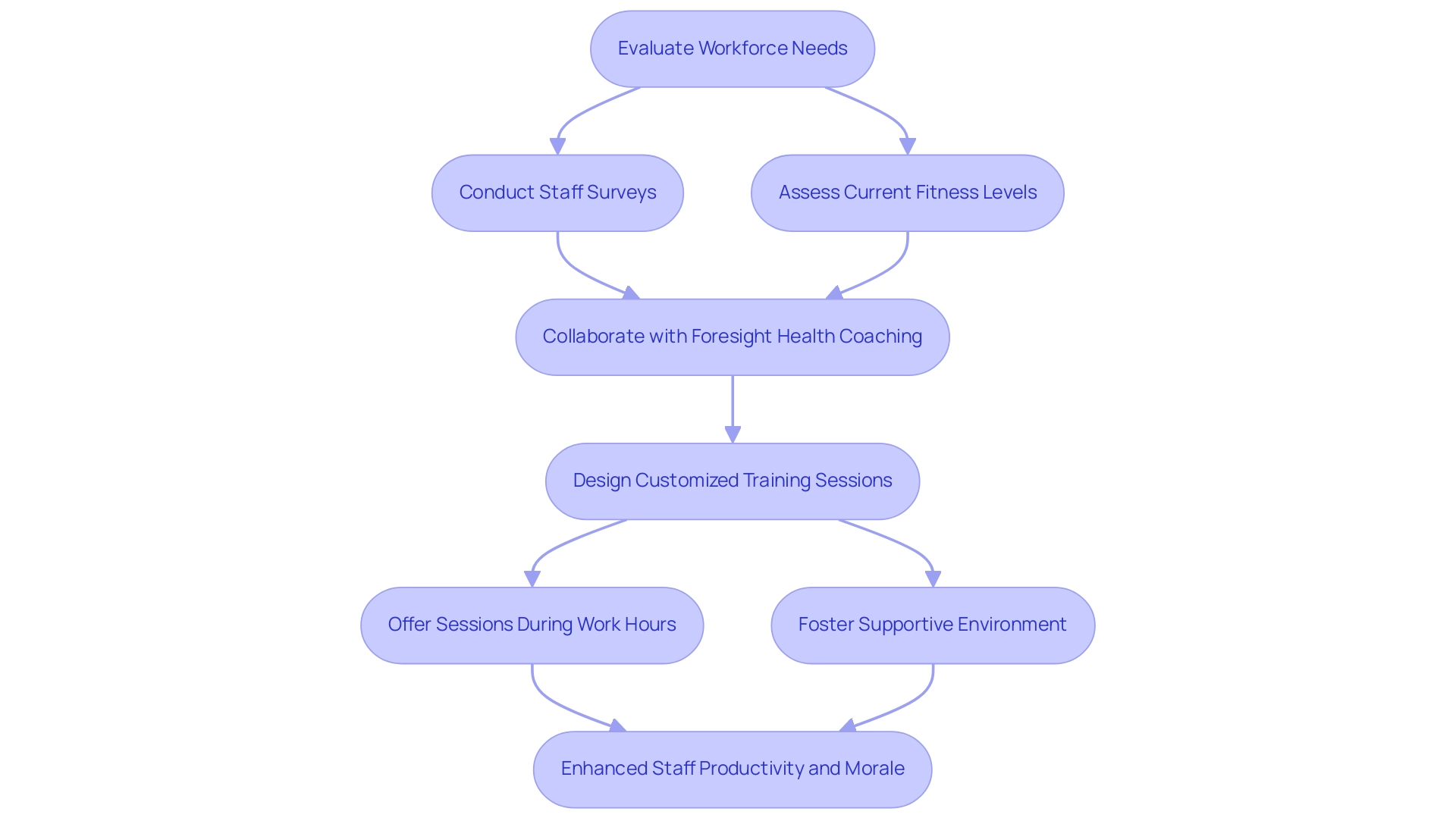
Overcoming Challenges in Integrating Deep Core Training into Workplace Wellness
Incorporating deep core training into workplace health initiatives can present challenges, particularly in terms of staff resistance, budgetary limitations, and time constraints. Historical data reveals that only 40% of staff believe their company invests in developing supportive managers, a factor directly linked to healthier workplace outcomes. This emphasizes the significance of managerial assistance in executing successful health initiatives.
According to Bank of America, health programs that include both mental and physical health resources lead to a 50% increase in employee productivity, underscoring the potential benefits of such initiatives. To effectively address these hurdles, organizations must prioritize clear communication about the myriad benefits of deep core training development. Establishing a culture that genuinely values health and wellness is crucial for fostering engagement.
Exploring budget-friendly options, such as group classes or online sessions, can also mitigate financial concerns. Furthermore, scheduling instructional sessions during lunch breaks or after work can alleviate time constraints, ultimately encouraging greater participation. The case study titled 'Managerial Support and Employee Well-Being' illustrates that enhancing manager development programs to focus on employee well-being can lead to healthier workplace environments and better employee outcomes.
By adopting these strategies, companies can enhance their wellness offerings while promoting a healthier and more productive workforce.
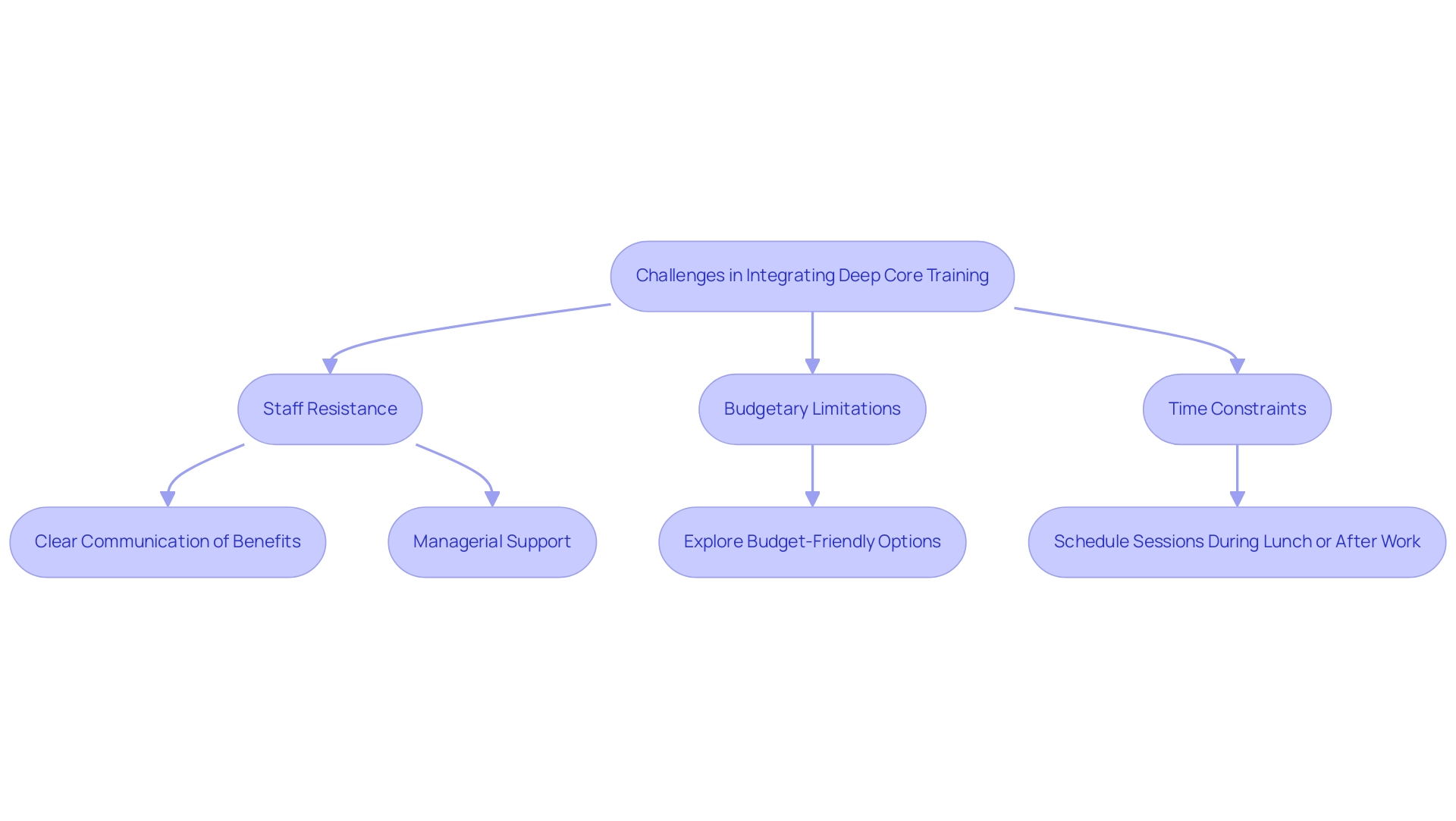
Measuring Success: Case Studies of Deep Core Training Impact in Organizations
Many organizations have effectively incorporated deep foundational programs, producing exceptional results. For instance, a technology firm announced a significant 30% decrease in worker injuries related to back pain after implementing foundational exercise sessions. This aligns with broader trends where health promotion strategies have become prevalent; by 2014, over half of global employers had adopted such initiatives.
However, it is important to note that Group 3 health interventions scored 21%-30% lower than CDC scores in various health categories, highlighting the effectiveness of deep core training in comparison to other health initiatives. Another organization highlighted a significant boost in productivity metrics, with employees attributing this improvement to enhanced focus and reduced fatigue. As Schwandt noted,
The categories provided an interpretive framework for contextualizing the participant’s experiences and the extent to which they perceived the effectiveness of different health interventions.
These case studies highlight not only the effectiveness of deep foundational exercises but also the crucial role of organizational backing, as illustrated in the case study titled 'Nutrition and Organizational Support,' which addresses the significance of incentives such as healthier food choices and flexible work hours. Additionally, health programs that include initiatives for stress and high blood pressure management further complement efforts in deep core training. Such practices foster an environment conducive to employee well-being and productivity, serving as a model for organizations considering similar wellness initiatives.
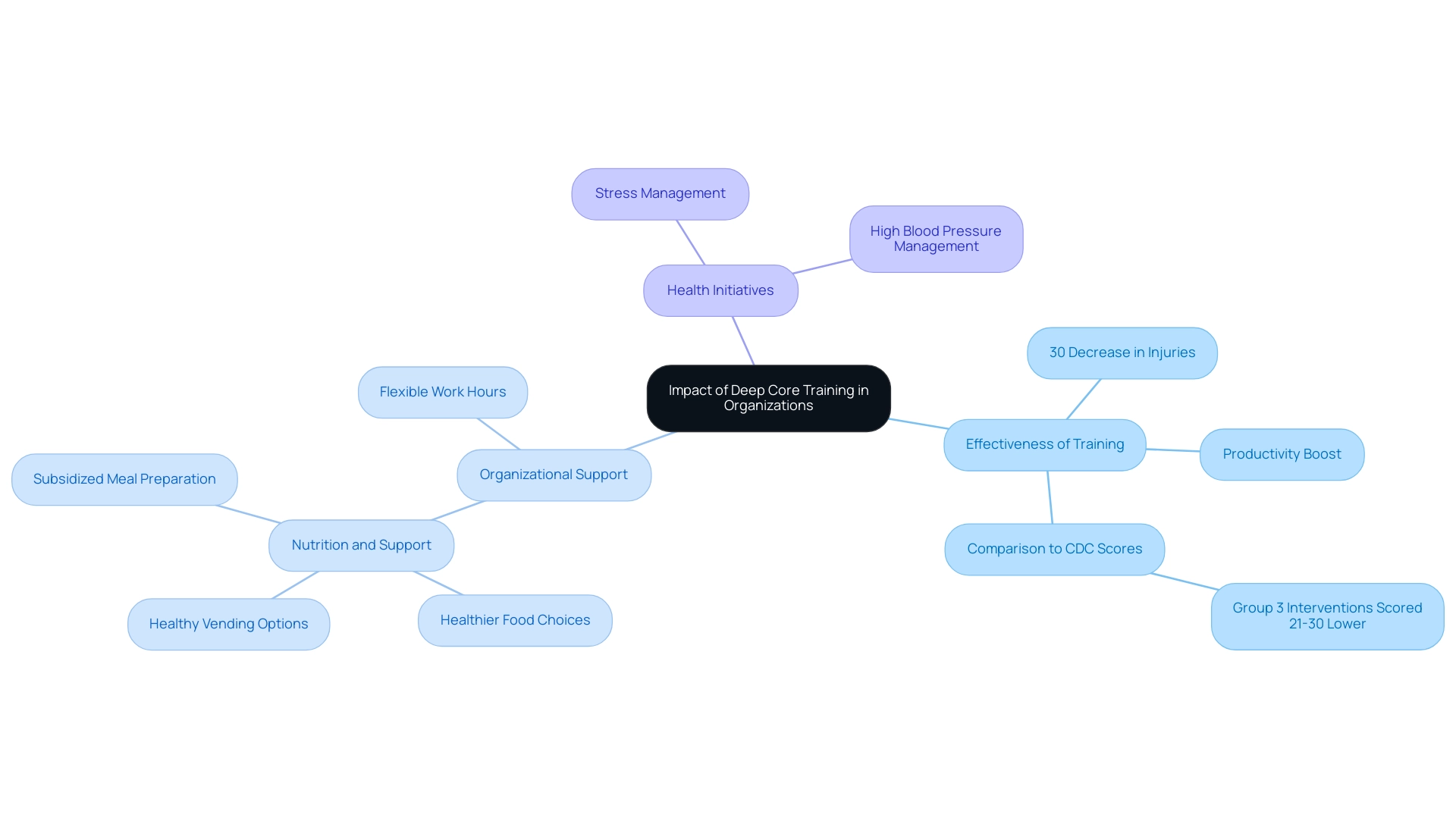
Conclusion
The integration of deep core training into workplace wellness programs presents a transformative opportunity for organizations aiming to enhance employee health and productivity. By reinforcing the muscles that stabilize the spine and pelvis, deep core training addresses the critical issues of poor posture and the associated risks of workplace injuries, particularly in environments where employees spend extended periods seated. This specialized training not only mitigates health-related absenteeism but also fosters a more engaged and productive workforce.
The benefits of implementing deep core training extend beyond physical health; they also encompass improved mental well-being and increased energy levels. Organizations that prioritize these wellness strategies can cultivate a supportive culture that enhances team morale and cohesion. By tailoring programs to meet the specific needs of employees and providing managerial support, companies can overcome common challenges and drive participation in wellness initiatives.
Case studies illustrate the tangible impact of deep core training, showcasing significant reductions in workplace injuries and notable improvements in productivity metrics. As organizations increasingly recognize the importance of holistic wellness strategies, the implementation of deep core training emerges as a vital component in fostering a healthier work environment. Embracing this approach not only enhances employee well-being but also positions companies for long-term success in a competitive landscape, demonstrating that investing in core strength is indeed an investment in the future of the workforce.




